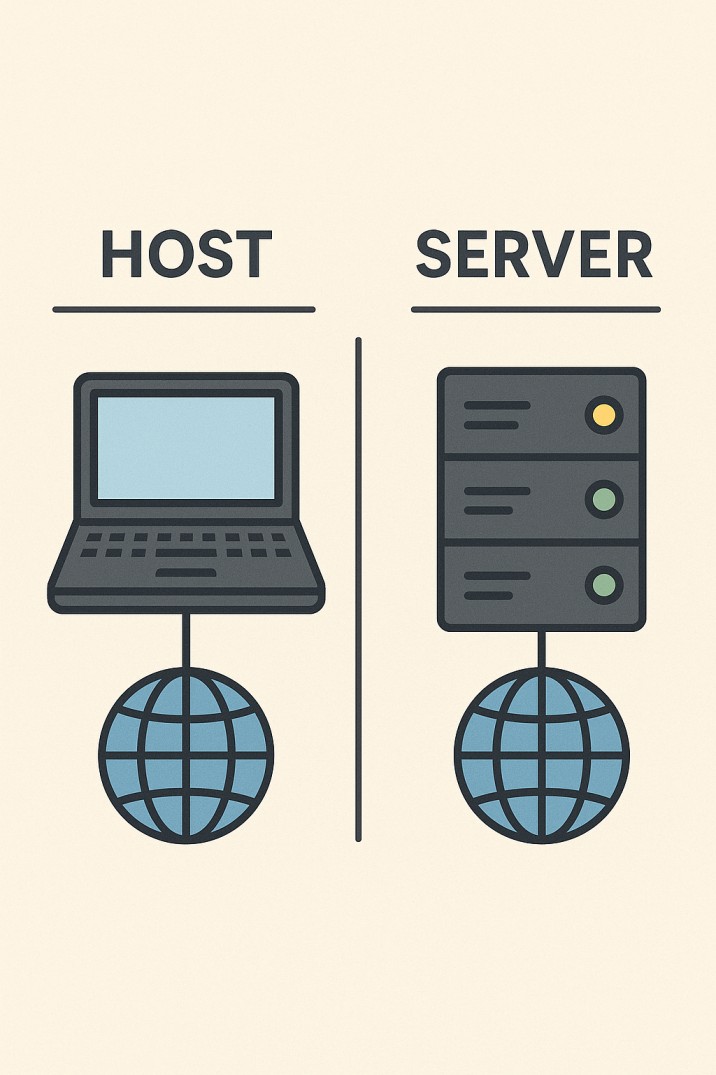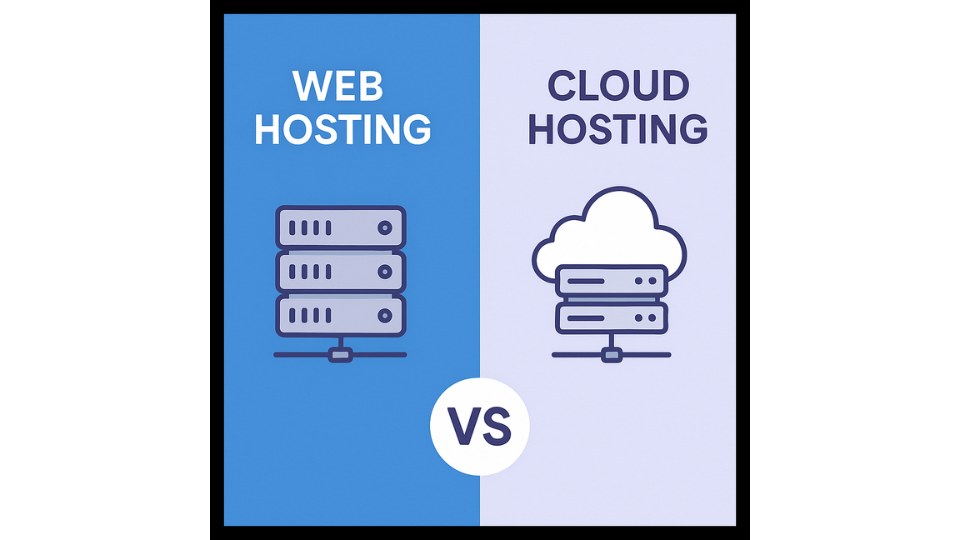In the world of networking and web hosting, the terms host and server are often used interchangeably, but they don’t mean the same thing. A host is any device that connects to a network, while a server is a specialized machine or software that provides resources, data, or services to other devices. Understanding this difference is essential for beginners learning about websites, businesses choosing hosting solutions, and tech enthusiasts exploring how the internet works. By clearly separating the two, you can make smarter decisions about hosting, troubleshoot issues faster, and communicate effectively with IT professionals.
What is a Server?
A server is a powerful computer or virtual machine that stores, processes, and delivers data or services to other devices—called clients—over a network. Unlike a regular computer used by one person, a server is designed to handle multiple requests at the same time, ensuring that websites, applications, emails, or files are always available when needed.
Servers are running specialized server software (such as Apache, Nginx, or Microsoft IIS) and can perform many roles, including:
Web Server – hosting websites and delivering web pages to browsers.
Database Server – storing and managing structured data for apps and websites.
Mail Server – handling emails across networks.
File Server – storing and sharing files securely.
In simple terms, whenever you open a website, stream a video, or check your email, a server is working in the background to make that possible.
What is a Host?
A host is any device connected to a network that has a unique IP address, allowing it to send and receive data. This includes computers, smartphones, printers, IoT devices, and even servers themselves. In other words, a host is not limited to being a powerful machine — it’s simply any device that “hosts” an identity on a network.
In the web hosting context, the term “host” is also commonly used to describe companies or services that provide the infrastructure and resources (such as servers, storage, and bandwidth) to make websites accessible on the internet.
Examples of Hosts
Your laptop is connected to Wi-Fi.
A smartphone using mobile data.
A server providing website content.
A printer on a local office network.
Read: How to Understand Nameservers and Their Functionality?
Host vs Server: An In-Depth Explanation
- Definition and Core Role
Host
A host is any device connected to a network (local or internet) that has a unique IP address. Its role is to communicate with other devices and exchange data.
Examples: Laptop, smartphone, IoT device, or a physical server.
Even your personal computer is a host when it connects to Wi-Fi.
Server
A server is a specific type of host designed to handle requests and provide services, data, or applications to other hosts (clients).
Examples: Web server (Apache/Nginx), mail server, database server.
Unlike a regular host, servers are optimized for high availability, scalability, and performance.
Key Point: Every server is a host, but not every host is a server.
- Scope and Network Identity
Host
A host’s main requirement is having an IP address.
It doesn’t need to provide services — simply being part of a network makes it a host.
Example: A printer on your office LAN is a host because it can send/receive data, even though it doesn’t “serve” websites.
Server
A server is service-oriented. Its entire existence is to provide something: websites, emails, files, databases, etc.
It must run server software and often operates 24/7.
Example: The machine powering your WordPress website is a server, because it serves content when visitors request it.
- Functional Difference
Host
Passive in most cases — just exists on the network, communicates, and exchanges data.
Can act as a client (your PC requesting a web page).
Server
Active by design — waits for requests from clients/hosts and responds.
Handles thousands or even millions of requests at once.
Example: A web server sending HTML files to thousands of browsers at the same time.
- Web Hosting Context
Host
In the hosting industry, “host” is also shorthand for hosting companies (like Hostripples).
They rent server space, storage, and bandwidth to users so websites are accessible online.
Server
The actual machine (physical or virtual) where the website files, emails, and databases are stored.
Example: In shared hosting, one server powers hundreds of websites. In VPS/dedicated hosting, resources are isolated.
- Performance and Resources
Host
Not optimized for heavy workloads.
A host can be small (like a Raspberry Pi or IoT device).
Server
Built for performance, redundancy, and uptime.
Equipped with powerful CPUs, ECC RAM, NVMe storage, RAID setups, and redundant power supplies.
Example: A data center server delivering video streaming to millions of users.
- Security and Reliability
Host
May or may not have strict security (your home PC is a host, but often less secure).
Outages or disconnects only affect that host itself.
Server
Must implement strong security measures (firewalls, SSL, intrusion detection, Imunify360, backups, etc.).
Downtime affects all connected clients, making reliability crucial.
- Analogy to Simplify
Think of a host as any house in a city — it has an address and can send/receive information.
A server is like a grocery store in that city — not only does it have an address, but it actively provides goods and services to others.
- Key Takeaway
A host is any device connected to a network with an IP address.
A server is a specialized host that delivers services, data, or applications to other hosts.
In web hosting, your hosting provider (host) gives you access to a server that keeps your website live.
# Pros and Cons of Host vs Server
✅ Pros of a Host
- Broad Connectivity – Any device can be a host, making it easy to join networks.
- Flexibility – Can act as a client (consuming services) or as a server (providing services).
- Accessibility – Hosts only need an IP address to communicate over a network.
- Cost-Effective – A simple device like a laptop or IoT sensor can function as a host without high setup costs.
❌ Cons of a Host
- Limited Power – Most hosts aren’t designed for high-performance workloads.
- Not Service-Focused – Unless configured, hosts don’t provide resources to others.
- Security Gaps – Basic hosts (phones, PCs) often lack strong security.
- Single Point Use – A host usually supports just the person/device using it.
✅ Pros of a Server
- High Performance – Built with powerful CPUs, RAM, and NVMe storage for speed.
- 24/7 Availability – Designed for continuous uptime and reliability.
- Service-Oriented – Actively delivers websites, emails, databases, and apps.
- Scalable – Servers can handle thousands of simultaneous connections.
- Advanced Security – Firewalls, SSL, malware protection (e.g., Imunify360) are common.
❌ Cons of a Server
- Costly – Requires higher investment (hardware, licensing, maintenance).
- Complex Setup – Needs technical knowledge to configure and manage.
- Single Point of Failure – If a server goes down, it impacts many clients.
- Maintenance Overhead – Requires monitoring, patching, and backups.
Key Difference in Pros & Cons
A host is simple, broad, and low-cost but limited in power.
A server is powerful, reliable, and service-focused, but requires a higher cost and management.
Snippet-Ready Summary:
Hosts are flexible and inexpensive but limited in scope, while servers provide high performance and reliability at the cost of complexity and higher expenses.
Read: How to Build a Responsive Website That Works Everywhere?
FAQ: Difference Between a Host and a Server
- Is every server a host?
Yes. Every server is a type of host because it has an IP address and is part of a network. But not every host is a server — many hosts (like laptops or smartphones) don’t provide services.
- Can a normal computer act as a server?
Yes. A regular computer can be configured to act as a server if it runs server software (like Apache, Nginx, or MySQL). However, it won’t be as reliable or powerful as dedicated server hardware.
- What is the main difference between a host and a server?
A host is any device with an IP address on a network. A server is a specialized host that provides services, data, or applications to other hosts.
- Is a hosting company the same as a server?
No. A hosting company (like Hostripples) is a provider that rents out server resources. The server is the actual machine or virtual instance where your website files, emails, or applications are stored.
- Why do people confuse host and server?
Both terms are related to networks and web hosting. The confusion arises since servers are always hosts, and hosting providers are often called “hosts,” even though they sell access to servers.
- Which is more important: a host or a server?
Both are essential. A host ensures devices can connect to the network, while a server makes sure services and data are delivered reliably. Without hosts, devices can’t connect; without servers, no services can be shared.

